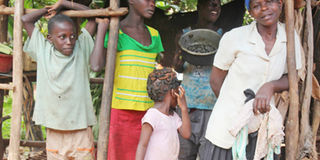Parents struggle to overcome pain of losing children to ritual sacrifice

Josephine Namanda, the mother of the child who was sacrificed three years ago, with her remaining children in Kirwanira, Matugga, Wakiso District. PHOTO BY EPHRAIM KASOZI.
What you need to know:
Josephine Namanda still sheds tears and prohibits her remaining children from wandering alone even when the incident occurred three years ago.
Kampala
Josephine Namanda sits in front of her rented single-roomed house in Kirwanira, Matugga, Wakiso District, still grieving over Rose Babirye, her twin child, who was sacrificed three years ago.
Thinking of her dead daughter, who was buried with missing body parts, has not only caused pain and trauma but has inflicted lifelong fear for the remaining children. Bereaved family members have learned to bear with the loss of Babirye but Namanda’s situation has worsened as she never allows her children to wander beyond the compound, escorting them whenever they go. She says the fear that the kidnapers may return for her other children is unnerving.
The regret
The single mother of seven is a casual labourer and because of poverty, she had to send her twin daughters to her sister for assistance, a decision she has lived to regret. It is there that the little girl was kidnapped and killed in a ritual sacrifice incident. “I keep wondering how my daughter was sent alone to a bushy garden which is about a mile away from home where we found her body parts scattered,” she says as tears flow down her cheeks uncontrollably.
According to Namanda, upon arriving at her sister’s home on the fateful Sunday evening, there was no explanation as to how Babirye had disappeared. “Poverty and disappearance of my husband greatly contributed to the death of my daughter and this has caused suffering and fear in my family. Because even when I would want to relocate to another area, I have no means and I can never trust anybody in life,” she laments.
Namanda, currently undergoing counseling at Kyampisi Childcare Ministries (KCM) is one of the many parents whose children were either murdered or survived with injuries of ritual sacrifice but no culprit was ever brought to book.
Pastor Peter Sewakiryanga, the head of KCM, describes Namanda’s situation as “traumatising and devastating”.
“She is in a poor state that needs continuous counselling and therapy,” Pr Sewakiryanga says.
He adds that the organisation has finalised plans to resettle the family in another village as a strategy to relieve trauma.
Mr Hudson Ssemwanga, the father to an eight-year-old boy who survived with a broken skull, describes the incident of losing a child in ritual sacrifice as a “wound that never heals.” “It is hard to forget because every time my son annoys me, I remember the state he went through and I simply forgive him.” He says he can no longer entrust his children with anyone, even close relatives.
Showing appreciated
“I am glad that we have a counsellor who volunteered to help us and bring all of us (victims) together and this has greatly changed my minds. For the past one year, I have been wondering how a person picked my son,” says a tearful Ssemwanga, who sold his plot to meet medical bills for his son.
According to Ms Prudence Atukunda, a clinical psychologist, it is a question of utilising the God-given gift of managing situations to control minds and thoughts. “It is about seeking God and appreciating the gifts life offers. Ritual sacrifices are an unplanned happenings, so people should not judge themselves over cases they did not commit as this deters development in communities,” says Ms Atukunda. “If you get depressed, you end up in a psychiatric hospital but one must know that there is no person with a clean record, there are always disturbances which hurt their mind.”




